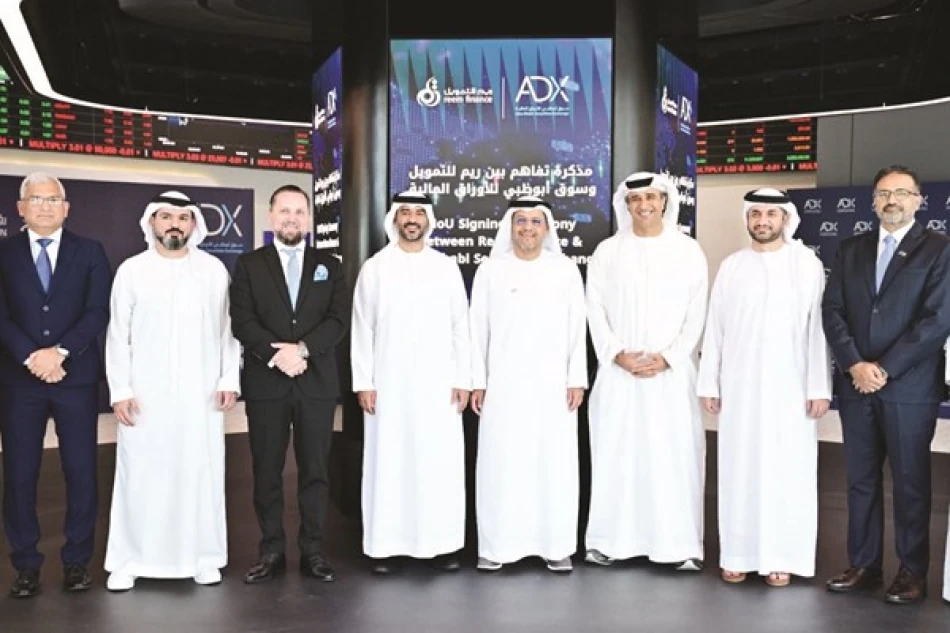
Ream Finance and Abu Dhabi Securities Exchange Announce Groundbreaking Partnership
Abu Dhabi Exchange Partners with Digital Bank to Democratize Stock Trading Access
Abu Dhabi Securities Exchange (ADX) has signed two strategic agreements with Reem Finance that will allow investors to obtain national investor numbers instantly and participate in IPOs directly through a digital banking platform. The move represents a significant step toward making capital markets more accessible in the UAE, as the exchange continues building on strong momentum with foreign investment surging 99.5% year-on-year in the first half of 2025.
Instant Market Access Through Digital Integration
The first agreement enables immediate creation of national investor numbers through Reem Finance's digital platform. Previously, obtaining the required investor identification for trading on ADX involved bureaucratic delays that could discourage retail participation. Now, customers can generate their investor numbers directly through the Reem Finance mobile application, eliminating friction in the onboarding process.
This digital-first approach mirrors successful fintech integrations seen in Singapore and Hong Kong, where streamlined access has helped boost retail trading volumes. The UAE's push toward financial digitization aligns with its broader economic diversification strategy, positioning Abu Dhabi as a regional financial hub competing with Dubai's established DIFC.
IPO Participation Gets Margin Financing Boost
Under the second agreement, Reem Finance becomes an authorized receiving entity for initial public offerings, allowing investors to subscribe to IPOs directly through the bank's app. Crucially, the partnership includes margin financing options, enabling investors to leverage their positions when participating in new listings.
This development could significantly impact IPO subscription rates, particularly for retail investors who previously lacked easy access to financing for share applications. The timing appears strategic, as the UAE has seen increased IPO activity with companies like ADNOC's logistics arm and various real estate firms going public.
Market Performance Driving Digital Innovation
ADX's strong fundamentals provide a solid foundation for this digital expansion. The exchange recorded impressive growth in the first half of 2025, with total trading value rising 33.5% to AED 179.5 billion. Foreign investment inflows nearly doubled to AED 13.6 billion, suggesting international confidence in the market's trajectory.
These numbers indicate that institutional appetite is already strong—the challenge now is capturing retail investor interest. Digital accessibility could prove crucial for sustaining long-term growth, especially as younger, tech-savvy investors increasingly expect seamless mobile experiences.
Regional Competition and Strategic Positioning
The partnership reflects broader competition among Gulf financial centers. While Dubai has traditionally dominated regional finance through DIFC and NASDAQ Dubai, Abu Dhabi is leveraging its oil wealth and sovereign backing to build alternative infrastructure. Saudi Arabia's Tadawul has also pursued similar digitization efforts, making user-friendly access a regional priority.
Reem Finance's transformation into a "leading local digital bank" positions it to capture market share from traditional brokerages that may be slower to innovate. The bank's chairman, Hamdan Al Dhaheri, emphasized that this represents just the beginning of strategic initiatives with ADX, suggesting more integrated services ahead.
Investment Implications and Market Access
For investors, these agreements signal several key developments. Reduced barriers to entry could increase market liquidity and potentially reduce bid-ask spreads. Margin financing for IPOs may lead to higher subscription rates but also increased volatility in new listings.
The digital integration also suggests that traditional brokerage models face disruption in the UAE market. Banks offering comprehensive digital investment platforms may gain competitive advantages over standalone brokerages, particularly for cost-conscious retail investors.
This partnership represents more than technological convenience—it's a strategic move to democratize capital market access in a region where financial services have historically favored high-net-worth clients. Success could establish a template for similar initiatives across the Gulf, potentially reshaping how regional exchanges engage with retail investors.
Most Viewed News

 Layla Al Mansoori
Layla Al Mansoori






